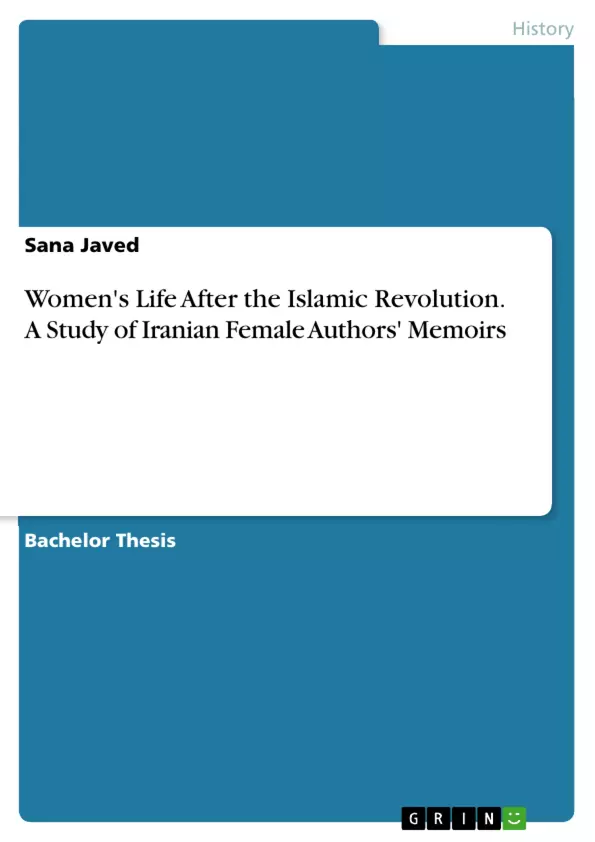This paper focuses on the description of Iranian women's life after the Islamic Revolution of 1979 as depicted in selected memoirs. It delves into the associated challenges that women in Iranian society were forced to accept following the revolution.
After the Islamic Revolution, Iranian women writers started portraying certain aspects of women's lives in their novels. This study presents three selected memoirs authored by Iranian women after the 1979 revolution, structured around both the pre- and post-revolutionary periods. Often, Iranian women intellectuals are forced to endure 'exilic liminality', potentially leading to an existential and identity crisis, the inability to find home either in Iran or the West, and a painful oscillation between cultures and identities. Women in Iranian society had to accept this revolution, or rather, they were enforced to accept it. The investigation primarily focuses on common attributes and problems they face in life post-revolution, along with the progressions in women's lives as depicted inside memoirs.
Inhaltsverzeichnis (Table of Contents)
- ABSTRACT
- Table of Contents
- CHAPTER 1
- INTRODUCTION
- 1.1 Background of the study
- 1.3 Purpose of the Study
- 1.4 Research Gap and Rationale of the Study
- 1.7 Research Question
- 1.10 Organization of the Study
- CHAPTER 2
- LITERATURE REVIEW
- 2.1 Islamic Revolution of Iran
- 2.2 Reza Shah Regime
- 2.3 Prime Minister Mohammad Mossadeg
- 2.3 Modernization Period
- 2.4 Ashraf Pahlavi
- 2.3 Rafsanjani's Presidency
- Summary of the Chapter
Zielsetzung und Themenschwerpunkte (Objectives and Key Themes)
This thesis aims to analyze the impact of the 1979 Iranian Revolution on the lives of Iranian women through the lens of selected women's memoirs. The study examines the experiences of Iranian women intellectuals who navigated the complexities of a changing society and grappled with issues of identity and belonging. By exploring the pre- and post-revolutionary periods, the study sheds light on the challenges and opportunities Iranian women faced in the wake of this momentous event.
- The impact of the Iranian Revolution on the lives of Iranian women
- The experiences of Iranian women intellectuals in the context of societal change
- The themes of identity, belonging, and cultural transitions
- The portrayal of women's lives in Iranian women's memoirs
- The concept of 'exilic liminality' and its implications for Iranian women
Zusammenfassung der Kapitel (Chapter Summaries)
Chapter 1 provides an introduction to the study, outlining its background, purpose, research gap, rationale, research question, and organization. Chapter 2 offers a comprehensive literature review, exploring the historical context of the Islamic Revolution in Iran, including the Reza Shah regime, the premiership of Mohammad Mossadeg, the modernization period, the role of Ashraf Pahlavi, and the presidency of Rafsanjani.
Schlüsselwörter (Keywords)
The study focuses on the key concepts of Iranian women, women's memoirs, the Iranian Revolution, and the experience of 'exilic liminality'. These themes are central to understanding the complex narratives of Iranian women in the wake of the 1979 revolution.
Frequently Asked Questions
How did the 1979 Islamic Revolution affect Iranian women's lives?
The revolution enforced significant legal and social changes, which many women authors depict as challenges to their identity, freedom, and professional lives.
What is "exilic liminality" in the context of Iranian authors?
It refers to the state of being "in-between" cultures, where intellectuals feel they belong neither fully to Iran nor to the West, leading to identity crises.
Which historical periods are covered in these memoirs?
The memoirs typically cover the pre-revolutionary era (including the Pahlavi regime) and the post-1979 period under the Islamic government.
What themes are common in memoirs by Iranian women writers?
Common themes include identity struggles, the loss of home, political oppression, and the oscillation between traditional and modern values.
Why are memoirs significant for understanding post-revolutionary Iran?
They provide personal, nuanced insights into how societal changes were experienced on an individual level, beyond official historical narratives.
- Arbeit zitieren
- Sana Javed (Autor:in), 2021, Women's Life After the Islamic Revolution. A Study of Iranian Female Authors' Memoirs, München, GRIN Verlag, https://www.grin.com/document/1371535



